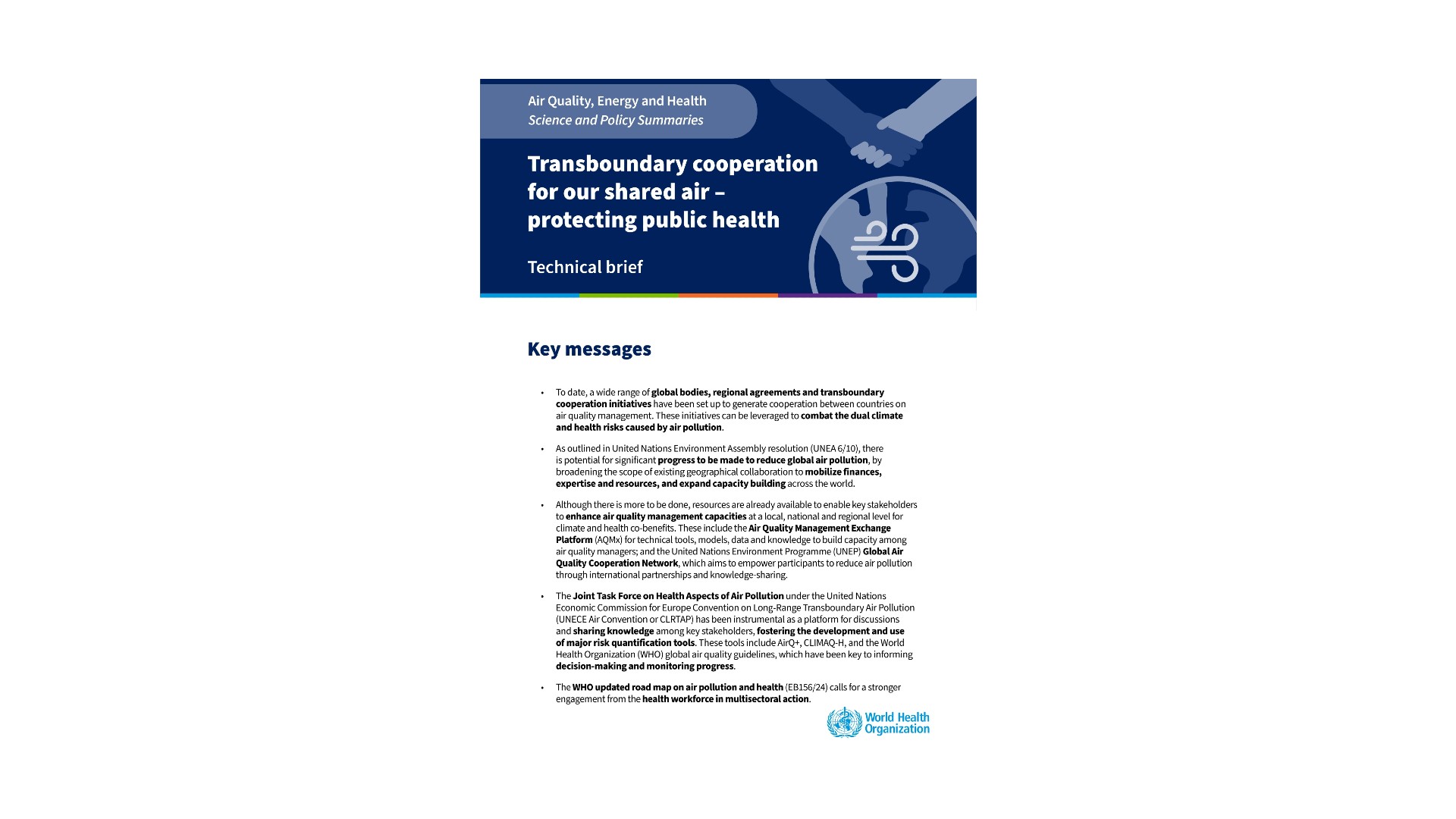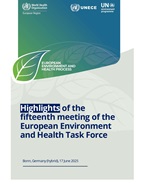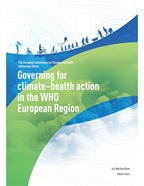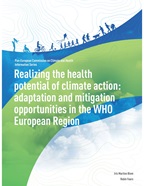Air quality
Air pollution is the leading environmental risk factor in the WHO European Region and is a major cause of disease and death. This makes it a priority to keep it below WHO air quality guideline levels for all.
Addressing air pollution not only has direct benefits for health but also helps reduce emissions that are driving climate change. In recent years, this dual impact has made air pollution a compelling argument for climate action.
Main air pollutants and their sources
The air we breathe contains various pollutants that are either directly emitted from different sources or formed in the atmosphere. Emissions originate largely from motor vehicles, industrial activities, combustion processes for heating, commercial sources and agriculture. Many drivers of air pollution (e.g. combustion of fossil fuels) are also sources of greenhouse gas emissions, and some air pollutants have climate-warming potential (e.g. ozone, black carbon).
In indoor settings, air can also contain pollutants, such as chemicals released from furniture, building materials and consumer products, tobacco smoke and emissions from household fuel combustion.
Air pollutants of major public health concern include particulate matter (PM2.5, PM10), carbon monoxide, ozone, nitrogen dioxide and sulfur dioxide.
Health effects of air pollution
Air pollution is one of the main risk factors for noncommunicable diseases. Exposure to polluted air contributes to the development and worsening of respiratory and cardiovascular diseases, such as asthma, ischaemic heart disease and stroke, and lung cancer. Moreover, air pollution has been linked to adverse perinatal outcomes, diabetes and neurological disorders. Vulnerable populations, such as children, older people and those with pre-existing health conditions, are particularly at risk.
Air quality policies can prevent diseases and save lives
Exposure to air pollutants is largely beyond individuals’ control and requires action by public authorities at the local, national, regional and even international levels. Through implementing proper air quality management, authorities can significantly prevent diseases and deliver sustainable health benefits. In addition, policies to limit air pollution, such as the promotion of active mobility and public transport, can bring several co-benefits for health – deriving from climate change mitigation, reduction of traffic injuries and noise, and increased physical activity.
Evidence from implemented policies shows that health protection is both possible and effective. For example, phasing out leaded petrol eliminated lead from vehicle emissions, which in turn decreased exposure in children and reduced the risk of impaired neurobehavioural development. A growing number of cities in the Region and across the world are restricting traffic emissions, with observable health benefits in cities where these schemes have been assessed.
In the WHO European Region, air pollution is responsible for a significant burden of deaths, hospital admissions and exacerbation of symptoms, especially for cardiovascular and respiratory diseases.
- In 2019, about 569 000 premature deaths were attributed to ambient (outdoor) air pollution and 154 000 to household (indoor) air pollution. These estimates relate to direct health effects of air pollution; an additional health burden is attributed to the indirect effects of air pollution, such as those associated with climate change.
- Exposure to particulate matter decreases life expectancy by an average of almost 1 year. This is mostly due to an increased risk of cardiovascular and respiratory diseases, and lung cancer. According to WHO data for 2019, 97% of the population in the European Region was exposed to fine particulate matter (PM2.5) concentrations above the levels in the WHO air quality guidelines.
In the European Region, WHO assesses and synthesizes the scientific evidence on the health risks and effects of air pollution, advocates for its use in public debate and in policy-making, and develops evidence-informed guidance for policy-makers on how to protect public health. In addition, WHO develops risk assessment tools and supports countries in developing sustainable policies on air quality and climate change mitigation.
Activities include:
- leading the process for the regular update of the WHO air quality guidelines, which are used worldwide as a reference tool to help decision-makers in setting standards and goals for air quality management;
- developing methods and tools to quantify the health risks of air pollution;
- supporting countries in assessing health risks from air pollution, including through building capacity, and strengthening the role of the health sector;
- leading regional intersectoral platforms such as the Joint Task Force on the Health Aspects of Air Pollution in support of international legal instruments including the Convention on Long-range Transboundary Air Pollution and the Paris Agreement on climate change, providing knowledge and health evidence to inform decision-making across sectors.
All activities aim at supporting countries in the European Region in improving air quality and reducing population exposure to air pollution and the associated health effects. These contribute to the implementation of the Declaration of the Seventh Ministerial Conference on Environment and Health (2023) and the Updated Road Map for an Enhanced Global Response to the Adverse Health Impacts of Air Pollution (2025).The road map, adopted by the World Health Assembly, includes a voluntary target to halve the health impacts from anthropogenic air pollution by 2040, compared to the 2015 baseline.














